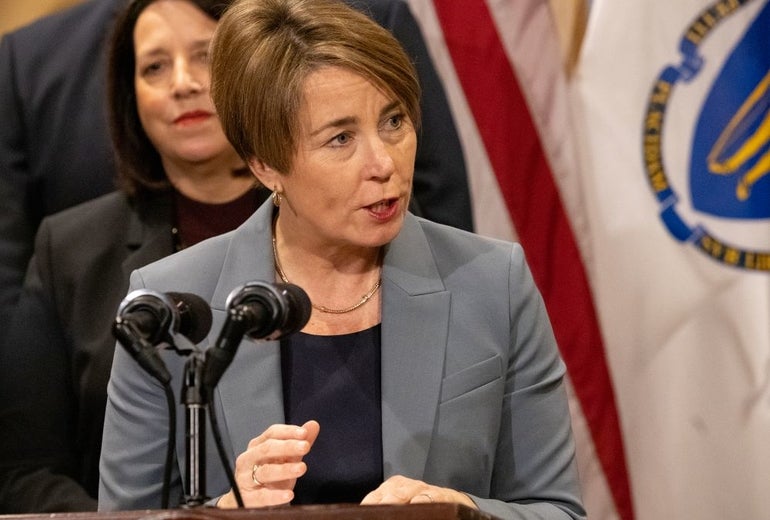Gov. Maura Healey is angling to attract federal dollars to Massachusetts for microelectronics and other tech advancements, despite the House appearing to not share her urgency.
Healey announced on Thursday that the Northeast Microelectronics Coalition, through the support of her administration and MassTech Collaborative, submitted a proposal to the federal government to turn the region into a hub for microtechnology development.
The coalition, made up of over 85 organizations across seven states, aims to build “a regional hub that will advance the microelectronics needs of the U.S. Department of Defense while spurring new jobs, workforce training opportunities and investment in the region’s advanced manufacturing and technology centers,” according to quasi-public agency MassTech.
The coalition submitted the proposal to the DoD’s “Microelectronics Commons” program, which uses funds from the recently passed CHIPS and Science Act to invigorate the country’s domestic semiconductor and microelectronics industry.
“Massachusetts is a leader on innovation, technology, and advanced manufacturing, and we’re proud to continue that legacy by submitting this proposal,” Healey said in a statement. “This is a once in a generation opportunity to invest in cutting-edge sectors that will be key to our country’s national security and ensure Massachusetts companies have the resources and workforce they need to succeed. We’re thrilled to put forth this competitive proposal to bolster the industries keeping Massachusetts at the forefront of innovation.”
The Microelectronics Commons program is the first federal CHIPS program to get started after the passage of the CHIPS and Science Act in August 2022, according to the coalition’s proposal. The program will disperse $1.63 billion over the next five years to establish nine regional hubs focused on manufacturing-specific technology focus areas such as artificial intelligence hardware and electronic warfare technology.
The coalition aims to build jobs and factories for “all six of the technology focus areas” that the grant program funds — edge computing security, 5G/6G wireless technology, artificial intelligence hardware, quantum technology, electronic warfare and commercial “LeapAhead” defense technology.
“The Northeast region has a tremendous amount of strengths to build upon for this proposal; our academic and federally funded research and development (R&D) centers are exceptional; however, this proposal is not just about R&D,” the proposal says. “It is about building pathways for these next generation technologies to move beyond the lab. These pathways require investment in new capabilities, growing capacity with industry partners, and expanding the size and know-how of our workforce. Exceptional industry, entrepreneur, risk capital, education, and workforce partners have raised their hands across the Northeast to bring what they have to the table to help with this.”
The U.S. leads the world in microelectronics design, but is only responsible for 12 percent of production globally, according to the DoD. The CHIPS Act, in part, is intended to bring that production from Asia to America to create more jobs and to become more economically independent from the countries where the microchips (that are necessary for everyday life in the U.S.) are mainly manufactured.
In January, Healey proposed $200 million in state match for federal grant programs included in the CHIPS and Science Act as part of her “immediate needs” bond bill.
The House on Wednesday passed a supplemental budget that included $585 million in bonding stemming from Healey’s bill — but did not fully include the $200 million to match funding for federal CHIPS Act dollars.
Pieces of Healey’s bond bill that weren’t wrapped into the House’s legislation are “still under consideration,” House Ways and Means Chair Aaron Michlewitz told the News Service on Wednesday.
“Those other ones that didn’t make it today are certainly being considered for something potentially down the road, but we haven’t gotten there yet,” Michlewitz said.
Though the full CHIPS funding didn’t make it, the chamber added a Michlewitz amendment just before the bill was passed on Wednesday designating $50 million for the Massachusetts Technology Park Corporation for a matching grant for federal programs related to technology-based economic development.
It also included other bond funding in its bill: $400 million for the MassWorks Infrastructure Program, $104 million for the Clean Water Trust to help finance municipalities’ efforts to improve local water quality and $34 million for the Underutilized Properties program, which is used for redevelopment of abandoned or underutilized properties.
Last month on WBUR, Healey said a state-supported $200 million outlay would show the federal government that the state has “skin in the game and is willing to put up the investment dollars.”
“I don’t want us to just be competitive. I want us to win. I want us to win these federal funds,” Healey said. “We’ve led the nation for so long in technology and innovation, life sciences. We just have a history here, and I want us to continue to lead by winning. So it’s not just about competing, it’s actually winning.”
Asked on Thursday if she is still aiming to get state funds to match federal CHIPS Act grants despite the House’s exclusion of her proposal in their bill, Healey responded, “Oh, absolutely.”
“Those funds are really, really important. And this is about our competitiveness. There’s important money out there under the CHIPS and Science Act,” she said. “Massachusetts has been the home of innovation and technology, and not just a national leader but a global leader. So we’re really well situated to really provide a great return on the investment of those funds, and so we’re going to continue to look to find ways to secure funding sources.”

